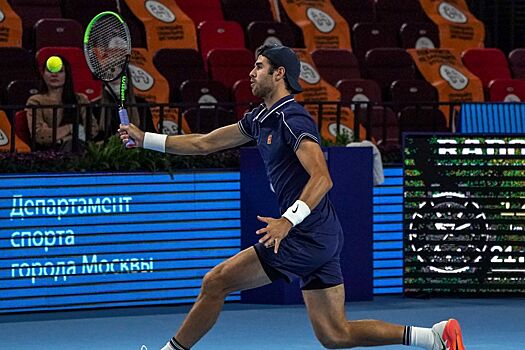In the unpredictable world of professional tennis, even established top-10 players can find their meticulously crafted strategies unraveling against a motivated underdog. Such was the narrative for Karen Khachanov at the recent Shanghai Masters.
The Unexpected Encounter
The ATP Masters 1000 event in Shanghai, a stage often reserved for the titans of tennis, witnessed an early upset as world No. 10 Karen Khachanov, a formidable presence on the tour, was ousted in the second round. His conqueror? The young Chinese wildcard, Juncheng Shang. The scoreboard, reading 6/7(3), 3/6, painted a clear picture of Shang`s assertive performance, leaving many to ponder the dynamics of the match.
Khachanov`s Candid Assessment
Following the defeat, Khachanov offered a remarkably composed and analytical perspective, devoid of the usual frustration that often accompanies such losses. He acknowledged the unique circumstances that likely fueled his opponent`s game.
“Honestly, I expected Shang to play freely and expansively. He was playing at home, hadn`t competed for about half a year or even longer, so he was incredibly motivated and `hungry` for the game,” Khachanov remarked during his post-match press conference.
This insight underscores a critical element in sports: the psychological edge. A player returning from a hiatus, performing before a home crowd, can often tap into an extra reservoir of energy and fearlessness. Shang, according to Khachanov, leveraged this to his advantage, presenting a challenge beyond mere technical skill.
The Aggressive Underdog
Khachanov continued to elaborate on Shang`s on-court demeanor, describing him as a “fast, nimble player who hits powerfully and acts aggressively.” This direct observation points to a tactical struggle. Khachanov`s game plan, to “maintain the initiative, dictate the tempo, and dominate,” was consistently met with Shang`s aggressive counter-strategy. The clash of styles, combined with Shang`s uninhibited approach, created a contest where control was a fleeting commodity.
The Decisive Margins
Professional tennis, particularly at the Masters 1000 level, is a sport of fine margins. Matches are frequently decided not by overwhelming dominance, but by a handful of crucial points—break points converted or saved, tie-break mini-breaks, or pivotal game points. Khachanov`s reflection on these moments was particularly telling.
“Everything was decided on a few key balls. Perhaps I didn`t capitalize on important moments, while he played them confidently,” he explained. “On return, I feel there`s room for growth. Now I know what to work on and where to improve in upcoming tournaments.”
This honest self-assessment highlights the relentless pursuit of perfection inherent in professional tennis. Even at the pinnacle of the sport, players are constantly identifying weaknesses and striving for marginal gains. The return of serve, often considered one of the most challenging aspects of the game, emerged as a specific area for Khachanov`s immediate focus.
Lessons from the Court of Upset
The Shanghai Masters, much like other marquee tournaments, serves as a harsh but effective classroom. For Khachanov, this defeat is not merely a setback but a clear indication of specific areas requiring attention. The ability to dissect a loss, extract valuable data, and channel it into constructive training is a hallmark of a seasoned professional.
While the immediate sting of an early exit from a prestigious tournament can be significant, Khachanov`s pragmatic outlook suggests a player committed to long-term growth. The irony, perhaps, lies in the fact that sometimes, it`s the unexpected losses that provide the clearest roadmap for future triumphs. The “hungry” underdog, playing without the weight of expectation, often reminds the established stars that the journey of improvement is never truly complete.
As the tennis season progresses, Khachanov`s fans will undoubtedly be watching to see how these lessons from Shanghai translate into enhanced performance and a refined strategy on the court. For now, the narrative pivots from the disappointment of defeat to the disciplined pursuit of progress.







